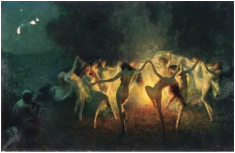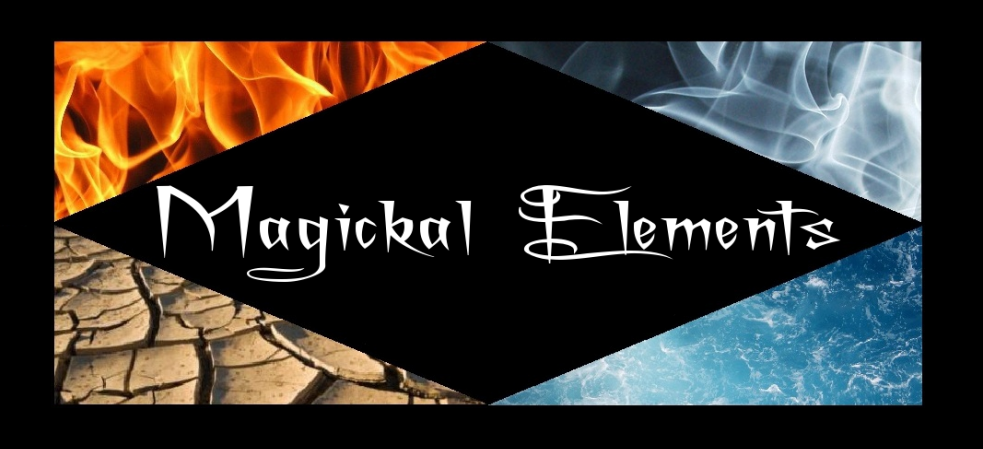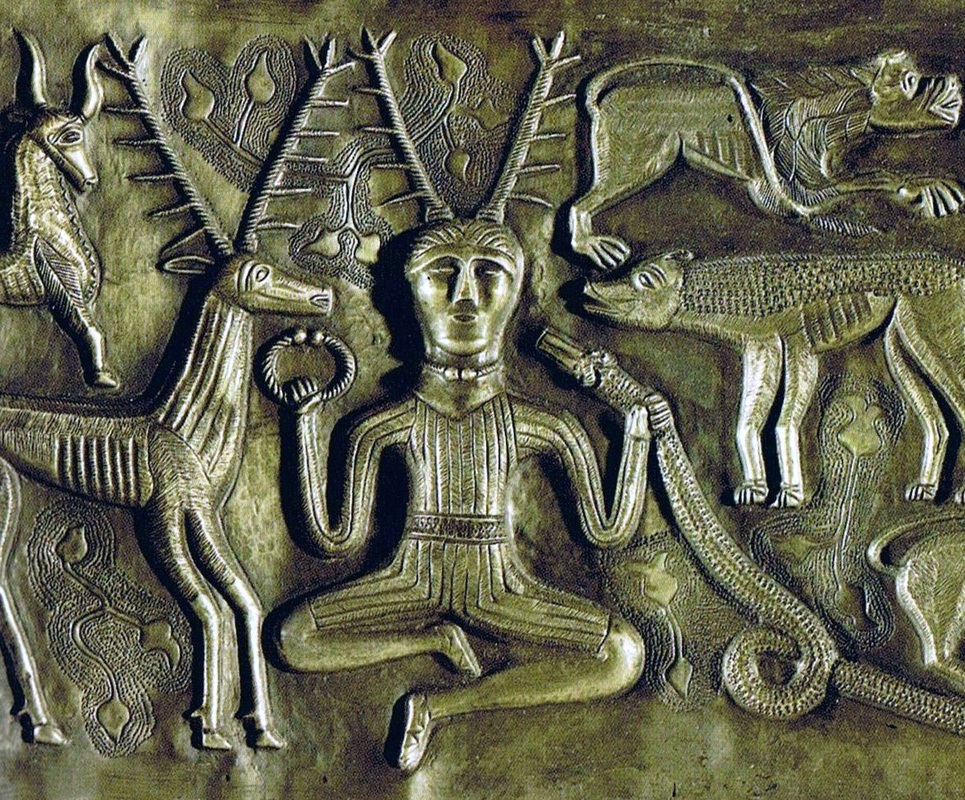In my first few posts I tried to explain what a pagan is and what a pagan does in hopes of dispelling some of the myths and common misconceptions surrounding pagan practices and beliefs. I think now is as good a time as any to bring a few more into the light. Here are some of the most popular:
- Pagans worship Satan.
- Paganism is a cult.
- Pagans all dress in Goth.
- Pagans cast spells and curse people.
- Pagans practice animal and human sacrifice.
- Drug use is common.
- Pagans dance around in the nude all the time.
- All rituals and celebrations involve sex orgies.
Pagans Worship Satan
 Pan
Pan I’ve said it before, I’ll say it again. The devil is a Christian concept to which most pagans do not subscribe. It’s hard to worship something that you don’t even believe in! But let’s take a closer look at it anyway. When you think of the devil, what image comes into your head? A great horned beast with cloven hooves, a forked tail and great bat wings? Many believe that this common visual image of Satan is actually derived from descriptions of ancient pagan gods. Pan comes to mind, with horns and the legs of a goat. Pan is actually a Greek nature god, musical and lusty; he is also a symbol of fertility. As Christianity became more widespread, pagan gods were demonized and their worship condemned in order to encourage conversion. As Pan was such a widespread and popular god, his likeness was perverted into the frightening devil image we have today. So, do pagans worship Satan? No. We don’t even believe in Satan. But, many do honour the Horned God, a symbol of life
and fertility.
and fertility.
Paganism is a Cult
Well, it depends on which definition you use.
Merriam-Webster - a system of religious beliefs and rituals.
Yes, I guess it is a cult. And so is every other religion, including Islam, Judaism, Hinduism and Christianity.
From a Christian context – a religious group that denies one or more of the fundamentals of biblical truth.
So, anything not in the bible is a cult. Yep, I guess pagans qualify.
Free Dictionary – a religion or sect considered to be extremist or false, usually with an authoritarian, charismatic leader.
Now we’re getting somewhere. Though the word “cult” has different definitions depending on the point of view, this is the one that resonates with most people. What else springs to mind? Vulnerable people snatched from their friends and families, living in a rigid commune setting and brainwashed into a state of virtual enslavement to a leader with a Messiah complex, and eventual death or imprisonment all due to a programmed set of crackpot beliefs?
Let’s have a quick look at some of the more famous cults:
Merriam-Webster - a system of religious beliefs and rituals.
Yes, I guess it is a cult. And so is every other religion, including Islam, Judaism, Hinduism and Christianity.
From a Christian context – a religious group that denies one or more of the fundamentals of biblical truth.
So, anything not in the bible is a cult. Yep, I guess pagans qualify.
Free Dictionary – a religion or sect considered to be extremist or false, usually with an authoritarian, charismatic leader.
Now we’re getting somewhere. Though the word “cult” has different definitions depending on the point of view, this is the one that resonates with most people. What else springs to mind? Vulnerable people snatched from their friends and families, living in a rigid commune setting and brainwashed into a state of virtual enslavement to a leader with a Messiah complex, and eventual death or imprisonment all due to a programmed set of crackpot beliefs?
Let’s have a quick look at some of the more famous cults:
|
There are plenty of other examples, but these are terrifying enough. So do pagans belong to a cult of this variety? Sadly, in all religions, including paganism, there are those few with an unfortunate blend of deluded, extremist belief and enough charisma to pull others into their madness. And people of any faith are vulnerable to the mesmerizing power of such individuals. However, the majority of pagans value their independence and hold their own beliefs too dear to subjugate themselves in this fashion. And the majority of pagans value the concepts of freedom and individuality too much to become the type of leader who wants to bend others to their will.
Pagans are Goth

Pagans all dress in black, with black hair, pale skin, black nail polish and heavy makeup (usually black). Pagans value individuality and do tend to be non conformists. We are also very tolerant of how people express their individuality, as long as it doesn’t harm anyone. During ritual, many don garb of a type that you don’t see everyday; medieval dresses, tunics, cloaks and the like. It’s a way of separating from our workaday lives and focusing on our spiritual sides. As for our everyday existence, sure some pagans embrace the Goth look. But for the most part, we look just like everyone else.
Pagan Spells and Curses

Pagans are in collusion with the devil and his minions to perform the dark arts of witchcraft. Ahem. See point # 1.
This propaganda was a pretty successful effort by Christians to discourage pagan practices by making it evil and thereby swell their ranks with new recruits. Yes, some pagans practice magick, but if you read my post “What is Magick?” you’ll know just what that means. Of those pagans that practice magick, sure some do it for selfish and harmful reasons. Pagans are human; we have our rotten apples just as other religions do. But many pagans also believe in something called the Threefold Law. It’s a lot like the Golden Rule. It states that whatever you send out, you will receive back threefold. Meaning if you send out some negative, harmful energy, it will seriously come back and bite you in the behind. The Wiccan Rede is also revered, and it states clearly; “An ye harm none, do what ye will.” This is not a license to do whatever we wish to do. This quite clearly states, do what you want to do, as long as it doesn't harm anyone. “Harm” can be physical, mental, or emotional. A love spell may seem an innocuous thing, but consider the effects it may have. The subjects' free will has been subverted and that causes harm to that person. The caster may suffer harm consciously or subconsciously by knowing that the love is false. And what about the family and friends of the subject? What will happen to them when he/she turns away? Not so simple or harmless now is it? Magick is a serious thing, and its consequences must be carefully considered before any spell is cast.
You might be surprised to learn that there are probably more pagans that don’t practice magick than those that do. For many, paganism is a spiritual path and a way of connecting with the universe. Magick doesn't really play a part in their belief system.
This propaganda was a pretty successful effort by Christians to discourage pagan practices by making it evil and thereby swell their ranks with new recruits. Yes, some pagans practice magick, but if you read my post “What is Magick?” you’ll know just what that means. Of those pagans that practice magick, sure some do it for selfish and harmful reasons. Pagans are human; we have our rotten apples just as other religions do. But many pagans also believe in something called the Threefold Law. It’s a lot like the Golden Rule. It states that whatever you send out, you will receive back threefold. Meaning if you send out some negative, harmful energy, it will seriously come back and bite you in the behind. The Wiccan Rede is also revered, and it states clearly; “An ye harm none, do what ye will.” This is not a license to do whatever we wish to do. This quite clearly states, do what you want to do, as long as it doesn't harm anyone. “Harm” can be physical, mental, or emotional. A love spell may seem an innocuous thing, but consider the effects it may have. The subjects' free will has been subverted and that causes harm to that person. The caster may suffer harm consciously or subconsciously by knowing that the love is false. And what about the family and friends of the subject? What will happen to them when he/she turns away? Not so simple or harmless now is it? Magick is a serious thing, and its consequences must be carefully considered before any spell is cast.
You might be surprised to learn that there are probably more pagans that don’t practice magick than those that do. For many, paganism is a spiritual path and a way of connecting with the universe. Magick doesn't really play a part in their belief system.
Animal and Human Sacrifice

What exactly is a ritual sacrifice? If you’ve ever watched a TV show called “Buffy the Vampire Slayer”, one episode centred on Thanksgiving celebrations brings up an interesting point. The conversation went like this:
Anya – “I love a ritual sacrifice”
Buffy – “Not really a one of those.”
Anya – “To commemorate a past event, you kill and eat an animal. It’s a ritual sacrifice. With pie.”
Though considered barbaric by today’s standards, animals and people were offered up on sacrificial altars to appease and honour gods from many different cultures. Don’t start thinking it was just the pagans doing this though! Christianity, Judaism, Islam, Hinduism; all called for sacrifice, and some still do. Like other religions, paganism has evolved through the years, and many of the common practices of the past have changed or been discarded to correspond with changing ethos. While some pagans do indeed still practice animal sacrifice, most do not. Some actually hold the belief that all life is sacred and are appalled at the idea of killing an animal. Most of these have embraced vegetarian or vegan lifestyles. I believe that most pagans fall between these two extremes and this is the category that I fit into. I believe in nature. A wolf, bear, eagle or lion isn’t evil when it hunts and kills prey to survive. It’s natural, it’s necessary for life to continue in balance. It is not natural or necessary to kill something purely as a sacrifice however, and that makes all the difference.
Anya – “I love a ritual sacrifice”
Buffy – “Not really a one of those.”
Anya – “To commemorate a past event, you kill and eat an animal. It’s a ritual sacrifice. With pie.”
Though considered barbaric by today’s standards, animals and people were offered up on sacrificial altars to appease and honour gods from many different cultures. Don’t start thinking it was just the pagans doing this though! Christianity, Judaism, Islam, Hinduism; all called for sacrifice, and some still do. Like other religions, paganism has evolved through the years, and many of the common practices of the past have changed or been discarded to correspond with changing ethos. While some pagans do indeed still practice animal sacrifice, most do not. Some actually hold the belief that all life is sacred and are appalled at the idea of killing an animal. Most of these have embraced vegetarian or vegan lifestyles. I believe that most pagans fall between these two extremes and this is the category that I fit into. I believe in nature. A wolf, bear, eagle or lion isn’t evil when it hunts and kills prey to survive. It’s natural, it’s necessary for life to continue in balance. It is not natural or necessary to kill something purely as a sacrifice however, and that makes all the difference.
Drug Use in Pagan Ritual

There are those traditions that regularly use hallucinogenic substances to trigger or enhance spiritual experiences by altering their state of consciousness. Many pagans would tell you though, that with patience and practice, that altered state can be reached without the use of chemicals. Working hard for something makes the achievement all the more special. There's also the addictive nature of drugs to think about. Paganism is about freedom, not enslavement. Or imprisonment, given that drug use is also illegal. Consider the Rede that I mentioned a few paragraphs before. “An ye harm none, do what ye will.” Who is harmed by using drugs? The user, obviously. The drugs were likely supplied by a dealer, so the user is supporting the dealer, who then will go on to sell drugs to others. All kinds of people being harmed in that scenario. How about the violence that so often comes with drugs? Users, dealers, suppliers, law enforcement, innocent bystanders, they all suffer. Family and friends? They come to harm watching the user self destruct. Seeing a pattern here? It all boils down to one simple thing as far as I'm concerned: Don't do drugs!
Nudity in Pagan Ritual

If someone mentions a pagan ritual, I think there are a couple of images that spring to mind for many people. One is probably a bunch of people in black robes with their faces hidden in cowls, standing next to a blood soaked altar lit by candles. This scene is straight out of countless horror films about devil worshippers and I’ve already dispelled that one to death. The second image is of a bunch of people, especially women, dancing naked around a bonfire. Well, this one isn’t really that far from the truth. Pagans don’t see the human body as something that needs to be hidden at all costs. It is considered as sacred as any other form and nudity isn’t the big taboo that it is in many other religions. Many go nude, or “skyclad” during ritual. That being said, not all pagans are quick to strip and dance with joyful abandon. Nudity is a choice, it’s not mandatory, and everyone’s sensibilities are taken into account.
Ritual Sex and Orgies

I think this idea stemmed partially from the nudity involved in some pagan rituals. I mean, if men and women dance together naked, then sex naturally follows right? Remember that above all else, paganism is a nature based belief system centred on the cycles of life and death and rebirth. Ancient pagans were farmers, lives depended on the fertility of the land and the animals, so many of the rites were meant to ensure that fertility. Hmm….what is natural and calls fertility to mind…sex! Pagans don’t think that sex is a dirty, disgusting act that should be shrouded in darkness and secrecy. Sex is, and should be, a powerful, beautiful union between two consenting adults. Now that does not mean that we’ll just get busy whenever and wherever the mood strikes us. We are as private as most people are when it comes to intimacy with our partners. Public performances are exceedingly rare, but the primal and potent nature of sexual energy is invaluable for use in ritual. Most sex in ritual is conducted in a symbolic fashion, however. Uniting the feminine and masculine by plunging the athame into the chalice for example.
Some of you are wondering about this thing you’ve heard of called the Great Rite. Isn’t this an example of the debauchery going on in pagan gatherings? If you’ve seen the movie “The Da Vinci Code”, you’ll probably remember the part where Sophie witnesses her grandfather performing a sex ritual, causing her to flee the house and opening a rift between the two. This scene is an example of how the Great Rite may have been performed hundreds of years ago. It is meant to be a celebration of the union of the God and the Goddess. Today, instances of public intercourse during the Great Rite are so rare as to be a myth in itself. The rite is usually performed by the High Priest and High Priestess, who would ideally be in a secure, intimate relationship already. It is usually performed symbolically as I said before, or acted out but without actual skin to skin contact. If the tradition calls for actual intercourse, it is done in private, between two consenting adults. So, while sex does have its place, if you come to a ritual hoping for action, you’re going to be sorely disappointed.
Some of you are wondering about this thing you’ve heard of called the Great Rite. Isn’t this an example of the debauchery going on in pagan gatherings? If you’ve seen the movie “The Da Vinci Code”, you’ll probably remember the part where Sophie witnesses her grandfather performing a sex ritual, causing her to flee the house and opening a rift between the two. This scene is an example of how the Great Rite may have been performed hundreds of years ago. It is meant to be a celebration of the union of the God and the Goddess. Today, instances of public intercourse during the Great Rite are so rare as to be a myth in itself. The rite is usually performed by the High Priest and High Priestess, who would ideally be in a secure, intimate relationship already. It is usually performed symbolically as I said before, or acted out but without actual skin to skin contact. If the tradition calls for actual intercourse, it is done in private, between two consenting adults. So, while sex does have its place, if you come to a ritual hoping for action, you’re going to be sorely disappointed.
Hopefully I’ve shed a little bit of light on some common misconceptions, and dispelled some of the many myths surrounding paganism. The misinformation and half-truths that have been circulated by competing religions has cast a long shadow on what is at heart, a loving and peaceful religion. Until next time, blessed be!



 RSS Feed
RSS Feed
